Lemmopsis lutophila (Arnold) M. Schultz & M. Prieto
Studies in Mycology, 109: 614, 2024.. Basionym: Psorotichia lutophila Arnold - Ber. bayer. bot. Ges., 1, Anh.: 129, 1891
Synonyms:
Distribution:
Description: Thallus crustose, gelatinous when wet, dark grey-brown, dark blue-green or almost black, thin, granulose, paraplectenchymatous throughout. Apothecia at first half immersed, then sessile, 0.2-0.5 mm across, with an initially punctiform and urceolate, later expanded and flat, reddish brown disc, a usually evident parathecial ring, and a thin, smooth, finally often almost excluded thalline margin. Epithecium orange-brown; hymenium colourless, I+ blue; hypothecium colourless. Asci 8-spored, cylindrical-clavate, with a rather thick, not amyloid wall, without apical amyloid thickenings. Ascospores 1-celled (rarely 1-septate), hyaline, ellipsoid, (11.5-)13-20(-25) x 7.5-12.5 µm. Photobiont cyanobacterial, with entangled chains of globose cells surrounded by a yellowish brown gelatinous sheath. Spot tests: all negative. Chemistry: without lichen substances.Note: an ephemeral pioneer species colonizing disturbed sandy-loamy soil, described from the surroundings of Munich in Bavaria, and known from several localities in Central Europe. To be looked for in Italy.
Growth form: Crustose
Substrata: soil, terricolous mosses, and plant debris
Photobiont: cyanobacteria, coccaceous (e.g. Gloeocapsa)
Reproductive strategy: mainly sexual
Pioneer species
Poorly known taxon in need of further study
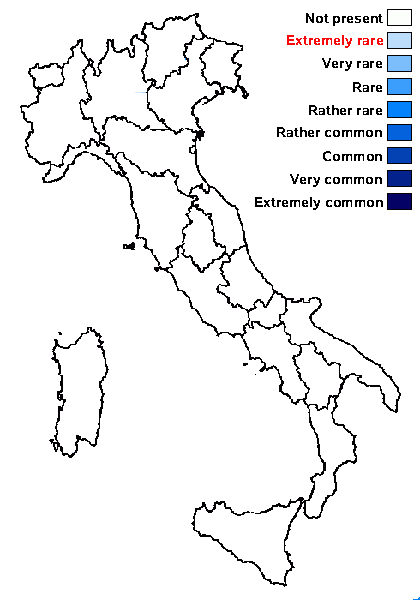
Predictive model
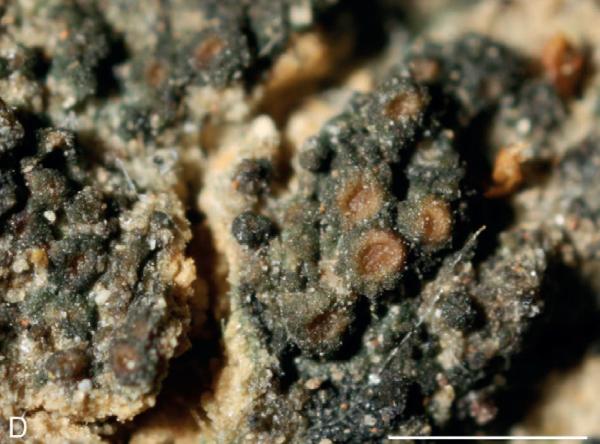
Source: Prieto M., Wedin M., Schultz M. 2024. Phylogeny, evolution and a re-classification of the Lichinomycetes. Studies in Mycology, 109: 595-655. - CC BY-NC-ND
Lemmopsis lutophila, apothecia semi immersed with distinct proper and thin thalline margin (Vezda, GZU) Scale: 1 mm


Felix Schumm - CC BY-SA 4.0
[13237], Germany, Nordrhein-Westfalen, Bergisches Land, Wuppertal,
am Eskesberg, Kalkerdeaufschüttung im Jahr 2005 im ehemaligen
Kalksteinbruch, 250 m. Leg. et det. G. Zimmermann, 01.07.2007.
Sporen zu 8, hyalin, einzellig, 16,4-28,3 x 6,5-9,8; Asci dünnwandig,
J-; Hymenialgallerte J+ hellblau; Photobiont: 4,4 μm, Cyanobakterien,
Xanthocapsa.
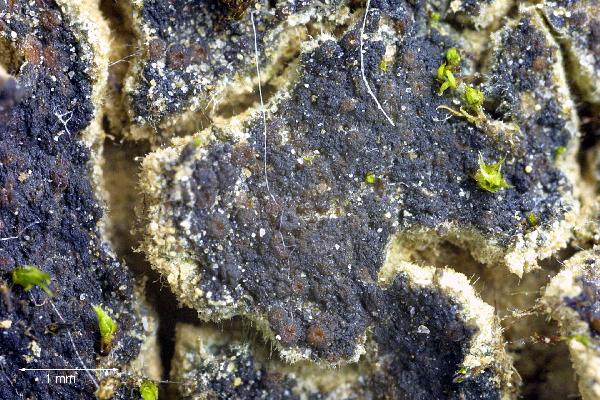

Felix Schumm - CC BY-SA 4.0
[13237], Germany, Nordrhein-Westfalen, Bergisches Land, Wuppertal,
am Eskesberg, Kalkerdeaufschüttung im Jahr 2005 im ehemaligen
Kalksteinbruch, 250 m. Leg. et det. G. Zimmermann, 01.07.2007.
Sporen zu 8, hyalin, einzellig, 16,4-28,3 x 6,5-9,8; Asci dünnwandig,
J-; Hymenialgallerte J+ hellblau; Photobiont: 4,4 μm, Cyanobakterien,
Xanthocapsa.


Felix Schumm - CC BY-SA 4.0
[13237], Germany, Nordrhein-Westfalen, Bergisches Land, Wuppertal,
am Eskesberg, Kalkerdeaufschüttung im Jahr 2005 im ehemaligen
Kalksteinbruch, 250 m. Leg. et det. G. Zimmermann, 01.07.2007.
Sporen zu 8, hyalin, einzellig, 16,4-28,3 x 6,5-9,8; Asci dünnwandig,
J-; Hymenialgallerte J+ hellblau; Photobiont: 4,4 μm, Cyanobakterien,
Xanthocapsa.
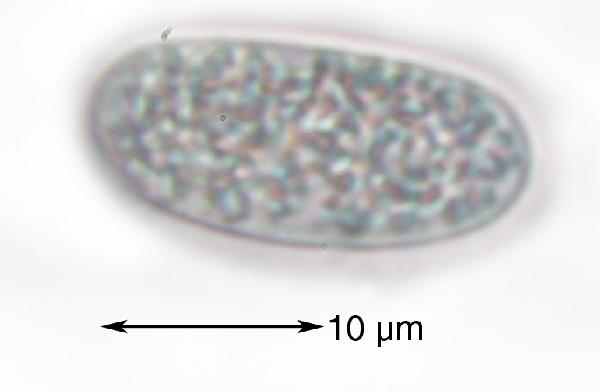

Felix Schumm - CC BY-SA 4.0
[13237], Germany, Nordrhein-Westfalen, Bergisches Land, Wuppertal,
am Eskesberg, Kalkerdeaufschüttung im Jahr 2005 im ehemaligen
Kalksteinbruch, 250 m. Leg. et det. G. Zimmermann, 01.07.2007.
Sporen zu 8, hyalin, einzellig, 16,4-28,3 x 6,5-9,8; Asci dünnwandig,
J-; Hymenialgallerte J+ hellblau; Photobiont: 4,4 μm, Cyanobakterien,
Xanthocapsa.


Felix Schumm - CC BY-SA 4.0
[13237], Germany, Nordrhein-Westfalen, Bergisches Land, Wuppertal,
am Eskesberg, Kalkerdeaufschüttung im Jahr 2005 im ehemaligen
Kalksteinbruch, 250 m. Leg. et det. G. Zimmermann, 01.07.2007.
Sporen zu 8, hyalin, einzellig, 16,4-28,3 x 6,5-9,8; Asci dünnwandig,
J-; Hymenialgallerte J+ hellblau; Photobiont: 4,4 μm, Cyanobakterien,
Xanthocapsa.


Felix Schumm - CC BY-SA 4.0
[13237], Germany, Nordrhein-Westfalen, Bergisches Land, Wuppertal,
am Eskesberg, Kalkerdeaufschüttung im Jahr 2005 im ehemaligen
Kalksteinbruch, 250 m. Leg. et det. G. Zimmermann, 01.07.2007.
Sporen zu 8, hyalin, einzellig, 16,4-28,3 x 6,5-9,8; Asci dünnwandig,
J-; Hymenialgallerte J+ hellblau; Photobiont: 4,4 μm, Cyanobakterien,
Xanthocapsa.


Felix Schumm - CC BY-SA 4.0
[13237], Germany, Nordrhein-Westfalen, Bergisches Land, Wuppertal,
am Eskesberg, Kalkerdeaufschüttung im Jahr 2005 im ehemaligen
Kalksteinbruch, 250 m. Leg. et det. G. Zimmermann, 01.07.2007.
Sporen zu 8, hyalin, einzellig, 16,4-28,3 x 6,5-9,8; Asci dünnwandig,
J-; Hymenialgallerte J+ hellblau; Photobiont: 4,4 μm, Cyanobakterien,
Xanthocapsa.
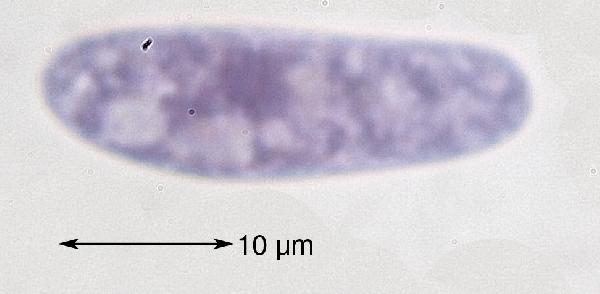

Felix Schumm - CC BY-SA 4.0
[13237], Germany, Nordrhein-Westfalen, Bergisches Land, Wuppertal,
am Eskesberg, Kalkerdeaufschüttung im Jahr 2005 im ehemaligen
Kalksteinbruch, 250 m. Leg. et det. G. Zimmermann, 01.07.2007.
Sporen zu 8, hyalin, einzellig, 16,4-28,3 x 6,5-9,8; Asci dünnwandig,
J-; Hymenialgallerte J+ hellblau; Photobiont: 4,4 μm, Cyanobakterien,
Xanthocapsa.
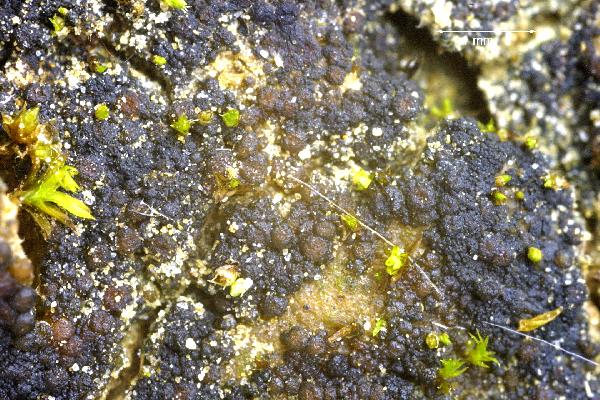

Felix Schumm - CC BY-SA 4.0
[13237], Germany, Nordrhein-Westfalen, Bergisches Land, Wuppertal,
am Eskesberg, Kalkerdeaufschüttung im Jahr 2005 im ehemaligen
Kalksteinbruch, 250 m. Leg. et det. G. Zimmermann, 01.07.2007.
Sporen zu 8, hyalin, einzellig, 16,4-28,3 x 6,5-9,8; Asci dünnwandig,
J-; Hymenialgallerte J+ hellblau; Photobiont: 4,4 μm, Cyanobakterien,
Xanthocapsa.
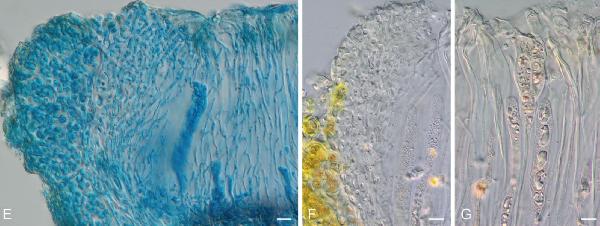
Source: Prieto M., Wedin M., Schultz M. 2024. Phylogeny, evolution and a re-classification of the Lichinomycetes. Studies in Mycology, 109: 595-655. - CC BY-NC-ND
E. Lemmopsis lutophila, zeorine apothecial
margin in LPCB (Arnold Lich. Monac. 74a, M holotype). F. Lemmopsis lutophila, distinct proper exciple in KOH. G. Lemmopsis lutophila, asci and paraphyses
in KOH (Zimmermann). Scale bars: E = 25 µm; F, G = 10 µm.
Growth form: Crustose
Substrata: soil, terricolous mosses, and plant debris
Photobiont: cyanobacteria, coccaceous (e.g. Gloeocapsa)
Reproductive strategy: mainly sexual
Pioneer species
Poorly known taxon in need of further study

Predictive model

Source: Prieto M., Wedin M., Schultz M. 2024. Phylogeny, evolution and a re-classification of the Lichinomycetes. Studies in Mycology, 109: 595-655. - CC BY-NC-ND
Lemmopsis lutophila, apothecia semi immersed with distinct proper and thin thalline margin (Vezda, GZU) Scale: 1 mm


Felix Schumm - CC BY-SA 4.0
[13237], Germany, Nordrhein-Westfalen, Bergisches Land, Wuppertal, am Eskesberg, Kalkerdeaufschüttung im Jahr 2005 im ehemaligen Kalksteinbruch, 250 m. Leg. et det. G. Zimmermann, 01.07.2007. Sporen zu 8, hyalin, einzellig, 16,4-28,3 x 6,5-9,8; Asci dünnwandig, J-; Hymenialgallerte J+ hellblau; Photobiont: 4,4 μm, Cyanobakterien, Xanthocapsa.


Felix Schumm - CC BY-SA 4.0
[13237], Germany, Nordrhein-Westfalen, Bergisches Land, Wuppertal, am Eskesberg, Kalkerdeaufschüttung im Jahr 2005 im ehemaligen Kalksteinbruch, 250 m. Leg. et det. G. Zimmermann, 01.07.2007. Sporen zu 8, hyalin, einzellig, 16,4-28,3 x 6,5-9,8; Asci dünnwandig, J-; Hymenialgallerte J+ hellblau; Photobiont: 4,4 μm, Cyanobakterien, Xanthocapsa.


Felix Schumm - CC BY-SA 4.0
[13237], Germany, Nordrhein-Westfalen, Bergisches Land, Wuppertal, am Eskesberg, Kalkerdeaufschüttung im Jahr 2005 im ehemaligen Kalksteinbruch, 250 m. Leg. et det. G. Zimmermann, 01.07.2007. Sporen zu 8, hyalin, einzellig, 16,4-28,3 x 6,5-9,8; Asci dünnwandig, J-; Hymenialgallerte J+ hellblau; Photobiont: 4,4 μm, Cyanobakterien, Xanthocapsa.


Felix Schumm - CC BY-SA 4.0
[13237], Germany, Nordrhein-Westfalen, Bergisches Land, Wuppertal, am Eskesberg, Kalkerdeaufschüttung im Jahr 2005 im ehemaligen Kalksteinbruch, 250 m. Leg. et det. G. Zimmermann, 01.07.2007. Sporen zu 8, hyalin, einzellig, 16,4-28,3 x 6,5-9,8; Asci dünnwandig, J-; Hymenialgallerte J+ hellblau; Photobiont: 4,4 μm, Cyanobakterien, Xanthocapsa.


Felix Schumm - CC BY-SA 4.0
[13237], Germany, Nordrhein-Westfalen, Bergisches Land, Wuppertal, am Eskesberg, Kalkerdeaufschüttung im Jahr 2005 im ehemaligen Kalksteinbruch, 250 m. Leg. et det. G. Zimmermann, 01.07.2007. Sporen zu 8, hyalin, einzellig, 16,4-28,3 x 6,5-9,8; Asci dünnwandig, J-; Hymenialgallerte J+ hellblau; Photobiont: 4,4 μm, Cyanobakterien, Xanthocapsa.


Felix Schumm - CC BY-SA 4.0
[13237], Germany, Nordrhein-Westfalen, Bergisches Land, Wuppertal, am Eskesberg, Kalkerdeaufschüttung im Jahr 2005 im ehemaligen Kalksteinbruch, 250 m. Leg. et det. G. Zimmermann, 01.07.2007. Sporen zu 8, hyalin, einzellig, 16,4-28,3 x 6,5-9,8; Asci dünnwandig, J-; Hymenialgallerte J+ hellblau; Photobiont: 4,4 μm, Cyanobakterien, Xanthocapsa.


Felix Schumm - CC BY-SA 4.0
[13237], Germany, Nordrhein-Westfalen, Bergisches Land, Wuppertal, am Eskesberg, Kalkerdeaufschüttung im Jahr 2005 im ehemaligen Kalksteinbruch, 250 m. Leg. et det. G. Zimmermann, 01.07.2007. Sporen zu 8, hyalin, einzellig, 16,4-28,3 x 6,5-9,8; Asci dünnwandig, J-; Hymenialgallerte J+ hellblau; Photobiont: 4,4 μm, Cyanobakterien, Xanthocapsa.


Felix Schumm - CC BY-SA 4.0
[13237], Germany, Nordrhein-Westfalen, Bergisches Land, Wuppertal, am Eskesberg, Kalkerdeaufschüttung im Jahr 2005 im ehemaligen Kalksteinbruch, 250 m. Leg. et det. G. Zimmermann, 01.07.2007. Sporen zu 8, hyalin, einzellig, 16,4-28,3 x 6,5-9,8; Asci dünnwandig, J-; Hymenialgallerte J+ hellblau; Photobiont: 4,4 μm, Cyanobakterien, Xanthocapsa.


Felix Schumm - CC BY-SA 4.0
[13237], Germany, Nordrhein-Westfalen, Bergisches Land, Wuppertal, am Eskesberg, Kalkerdeaufschüttung im Jahr 2005 im ehemaligen Kalksteinbruch, 250 m. Leg. et det. G. Zimmermann, 01.07.2007. Sporen zu 8, hyalin, einzellig, 16,4-28,3 x 6,5-9,8; Asci dünnwandig, J-; Hymenialgallerte J+ hellblau; Photobiont: 4,4 μm, Cyanobakterien, Xanthocapsa.


